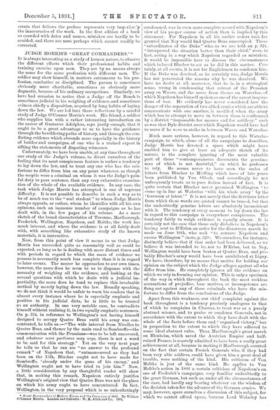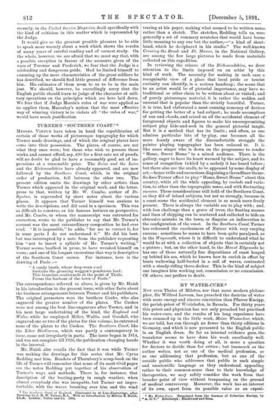JUDGE MORRIS'S "GREAT COMMANDERS."
IT is always interesting as a study of human nature, to observe the different effects which their professional habits and training exercise upon men. They are by no means always the same for the same profession with different men. The soldier may show himself, in matters extraneous to his pro- fession, combative or disciplined. The parson is sometimes obviously more charitable, sometimes as obviously more dogmatic, because of his ordinary occupations. Similarly, we have had occasion to notice that a Judge off the Bench is sometimes judicial in his weighing of evidence, and sometimes evinces chiefly a disposition, acquired by long habits of laying down the law. We are led into these reflections by a careful study of Judge O'Connor Morris's work. His friend, a soldier who supplies him with a rather interesting introduction on the career of Gustavus Adolphus, says justly enough, that it -ought to be a great advantage to us to have the guidance through the bewildering paths of history, and through the con- flicting evidence which abounds more especially in the history of battles and campaigns, of one who is a trained expert in sifting the statements of disputing witnesses.
Unfortunately, we have been unable, at any time throughout our study of the Judge's volume, to divest ourselves of the feeling that its most conspicuous feature is rather a tendency to lay down the law, and to treat any one who has the mis- fortune to differ from him on any point whatever, as though the sceptic were a criminal on whom it was the Judge's pain- ful duty to pass sentence, than any very exhaustive examina- tion of the whole of the available evidence. In any case, the task which Judge Morris has attempted is one of supreme -difficulty. It is not possible to describe in such a way as to be of much use to the " real student " to whom Judge Morris always appeals, or rather, whom he identifies with all his own opinions, such an immense number of campaigns as he has dealt with, in the few pages of his volume. As a mere sketch of the broad characteristics of Tnrenne, Marlborough, Frederick, Wellington, Napoleon, and Moltke, the work has much interest, and where the evidence is at all fairly dealt with, with something like exhaustive study of the known materials, it is instructive.
Now, from this point of view it seems to us that Judge -Morris has succeeded quite as reasonably well as could be -expected, as long as he is dealing with more distant times and with periods in regard to which the mass of evidence we possess is necessarily much less complete than it is in regard to later events. The nearer he approaches to our own times, however, the more does he seem to us to dispense with the necessity of weighing all the evidence, and looking at the several questions with which he deals with a judicial im- partiality, the more does he tend to replace this invaluable method by merely laying down the law. Broadly speaking, we do not think it would be unfair to warn his readers that in almost every instance where he is especially emphatic and positive in his judicial dicta, be is little to be trusted as an authority. In one very notable case, he contradicts himself without realising it, in two equally emphatic sentences. On p. 324, in reference to Wellington's not having himself designed to occupy Quatre Bras until his army was con- centrated, he tells us :—" The wide interval from Nivelles to Qnatre Bras, and thence by the main road to Sombreffe—the communication with the Prussians—was to be left uncovered, and whatever mere partisans may urge, there is not a word to be said for this strategy." Yet on the very next page he tells us that he can see "no answer to the profound remark" of Napoleon that, "outmanoeuvred as they bad been on the 15th, Blucher ought not to have made for Sombreffe, already under the guns of his enemy,' and Wellington ought not to have tried to join him." Now, a little consideration by any thoughtful reader will show that, in making this remark, Napoleon entirely justifies Wellington's original view that Qnatre Bras was not the place on which his army ought to have concentrated. In fact, Wellington, in the very proposal which is so unhesitatingly * Great Commanders of Modern Times, and the Cantraign of 1815. By William O'Connor Morris. London and Calcutta : W. H. Allen and Co. 1891.
condemned, was in even more complete accord with Napoleon's view of his proper course of action than is implied by this statement. For Napoleon in all his earlier orders took for granted that Ney would find Quatre Bras unoccupied. Those "subordinates of the Duke" who, as we are told on p. 324, " interpreted the situation better than their chief," were, in fact, acting in a way which Napoleon regarded as mistaken. It would be impossible here to discuss the circumstances which induced Blucher to act as he did in this matter. Cer- tainly, at all events, it is not for Englishmen to condemn him. If the Duke was deceived, as he certainly was, Judge Morris has not penetrated the reasons why he was deceived. We have no doubt at all, moreover, that he is, in a strategical sense, wrong in condemning that retreat of the Prussian army on Wavre, and the move from thence on Waterloo, of which Napoleon has himself spoken as one of the rarest inspira- tions of war. He evidently has never considered how the danger of the separation of two allied armies which are able to communicate with one another, is modified when the army which has to attempt to move in between them is confronted by a district " impassable for masses and for artillery," such as was that Dyle district over which Napoleon would have had to move if he were to strike in between Wavre and Waterloo.
Much more serious, however, in regard to this Waterloo campaign, to which, alone of all the campaigns he describes, Judge Morris has devoted a space which might have enabled him to give at least an adequate sketch of its nature, is the complete ignoring of the most valuable part of those "contemporaneous documents the genuine- ness of which is not doubtful," on which he professes to rely. He seems never to have seen the series of letters from Blucher to Muffling which have of late years been published by Von 011ech, and accordingly he not unfrequently treats us to pure fiction instead of fact. It is quite certain that Blucher never promised Wellington "to come up in line at Waterloo with his whole army' by the forenoon at latest.'" It is not merely that the fictitious letter from which these words are quoted cannot be traced, but that the undoubtedly genuine letters are absolutely inconsistent with it. The tendency at every moment to lay down the law in regard to this campaign is everywhere conspicuous. The tendency fairly to weigh evidence is equally absent. It is certainly not the case that those only disbelieve in Napoleon's having sent to D'Erlon an order for the disastrous march he made on June 16th, who seek " to censure Napoleon and excuse Wellington " (note, p. 329). We ourselves, for instance, distinctly believe that if that order had been delivered, as we believe it was intended to be, not to D'Erlon, but to Ney, Wellington would have been beaten at Quatre Bras, and pro- bably Blucher's army would have been annihilated at Ligny. We have, therefore, by no means that motive for holding our opinion on the subject which the Judge alleges against all who differ from him. He completely ignores all the evidence on which we rely in forming our opinion. This is only a specimen of the way in which throughout the book the most reckless accusations of prejudice, base motives, or incompetence are flung out against any of those criminals who have the mis- fortune to differ from the conclusions of the Judge.
Apart from this weakness, our chief complaint against the book throughout is a tendency precisely analogous to that of which he complains in Charms, to treat war as a purely abstract science, and to praise or condemn Generals, not in accordance with the extent to which they have dealt with the whole of the facts before them and " organised victory," but in proportion to the extent to which they have adhered to some ideal abstract rules. Thus, Marlborough's great march on Blenheim, which saved the Austrian Empire and half- ruined France, is scarcely admitted to have been a really great achievement at all, because in making it Marlborough counted on the fact that certain French Generals who, if they had been very able soldiers, could have given him a great deal of trouble, were nothing of the kind. His criticism of Von Moltke is just of the same kind. He applies to Von Moltke's action in 1866 a certain criticism of Napoleon's on one of Frederick's campaigns, very familiar undoubtedly to the great German, but such as, under all the circumstances of the case, had hardly any bearing whatever on the wisdom of the decision taken for the advance of the German armies. We may, however, spare ourselves a discussion of this subject, for which we cannot afford space, because Lord Wolseley has recently, in the United Service Magazine, dealt specifically with the kind of criticism in this matter which is represented by the Judge. It would give us the greatest possible pleasure to be able to speak more warmly about a work which shows the results of many years of careful reading and of earnest study. On the whole, however, we are afraid that we must say that, with a possible exception in favour of the accounts given of the wars of Turenne and Frederick, we fear that the Judge is a misleading and dangerous guide. Had he limited himself to summing up the mere characteristics of the great soldiers he has described, we should find little ground of difference from him. His estimates of them seem to us to be in the main just. We should, however, be exceedingly sorry that the English public should learn to judge of the character of mili- tary operations on the principles which are here laid down. We fear that if Judge Morris's rules of war were applied as he applies them, Macaulay's notion that the most effective way of winning victory is to violate all " the rules of war," would have much justification.



















































 Previous page
Previous page